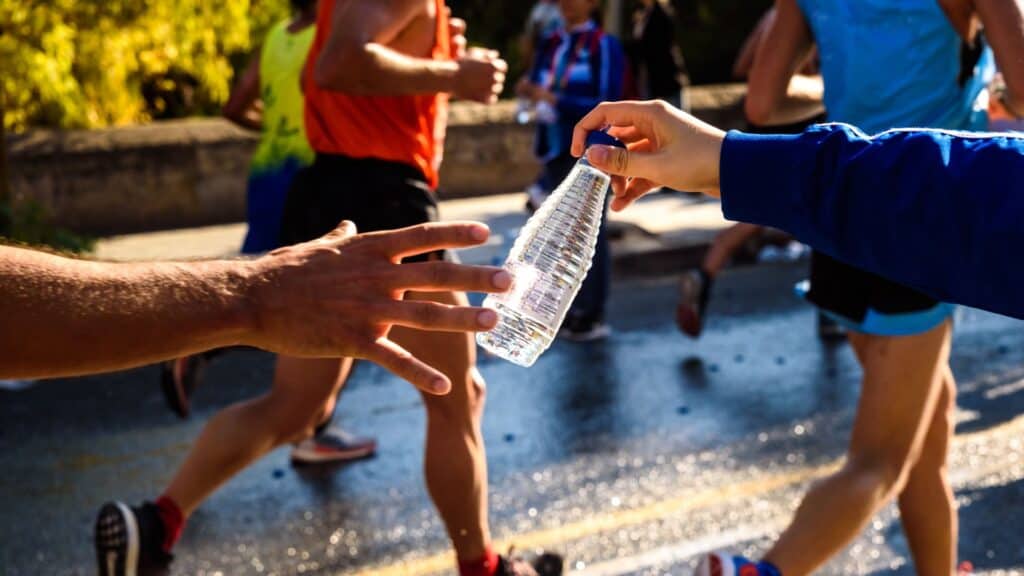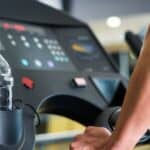Preparing for the Boston Marathon can be both exciting and stressful, whether it’s your first time or your tenth.
The morning of the Boston Marathon race day can be particularly nerve-wracking, as runners leave their comfortable homes and hotel rooms many hours before the race begins. As you sit on the bus to the Athlete’s Village in Hopkinton for an hour and wait for your gun time, you may wonder if what you’re eating an drinking before the race is correct…
Many runners have similar questions, such as what to eat in the hours before the race, what to bring with them on the bus or to the Athlete’s Village, and how much to consume before walking to their starting corral.
These are all valid concerns, as proper fuelling can make a big difference in race performance.
Fortunately, runners participating in the Boston Marathon have some nutrition and race fuel options along the route based on the information we have gathered from the last few years of the Boston Marathon.
It’s also vital to ensure you get your pre-race fuelling down to a tee way before raceday to give you the best chance in your race.
You will be given a small bag at registration that needs to fit all your race and pre-race nutrition for the trip to Hopkinton.
At the Athletes Village, there will be water, bananas, and sometimes bagels or granola bars.
Popular options include energy gels, sports drinks, bananas, oranges, bagels, and pretzels.
However, it’s important to keep in mind that different runners may have varying needs and preferences when it comes to fuel, and what works for one person may not work for another. And remember, NOTHING NEW ON RACE DAY!
To make the most of your Boston Marathon experience, it’s recommended to experiment with different fueling options, specifically on your long runs during your training, and determine what works best for you based on your individual needs and goals.
This can help you feel more confident and prepared come race morning.
In the following sections, we’ll take a closer look at optimal nutrition and provide tips for fueling up before and during the Boston Marathon.

Pre-Race Fueling: What to Eat Before the Boston Marathon
Nutrition Tips for Runners at the Boston Marathon:
- Experiment with various food options during training to find what works best for you.
- To prevent stomach discomfort on race day, it’s advisable to stick to the breakfast routine that you’ve practised numerous times during training.
- Familiarising yourself with the fueling options available at aid stations is an important aspect of marathon preparation, which we will discuss in more detail later in this article.
- Keep a focus on staying hydrated and consuming enough carbohydrates throughout the race.
When it comes to pre-race nutrition, remember the age-old adage, “Nothing new on race day.” This means that you should stick to the same eating and drinking habits that you have been practicing during your training.
The week before…
Throughout the entire week leading up to the race, it’s crucial to ensure you are consistently drinking enough fluids.
Staying adequately hydrated is essential for optimal performance and to support your body’s needs during this critical time.
Maintain a balanced diet that includes an adequate amount of carbohydrates while reducing fiber intake 2-3 days before the race to avoid gastrointestinal discomfort.

The night before…
To ensure you’re well-nourished for the Boston Marathon, it’s important to have a nutrition checklist ready the night before
- Breakfast is ready to go.
- A hydration pack filled (if permitted by the race) can be a convenient way to stay hydrated during a marathon. For example, while personal hydration systems are not allowed at the Boston Marathon, runners may use standard manufactured fuel belts with bottles that are one litre or smaller.
- Be sure to pack a snack, a water bottle, and a sports drink to have just before the race. While the snack and water provide nourishment and hydration, sipping on a sports drink before the race can help replenish energy stores and give an extra boost of electrolytes to support performance.
- Race nutrition is laid out, including gels, bars, rehydrate, sports drinks, and other fuel options.
- Make sure to drink enough fluids. It’s recommended that you begin hydrating at least three to four hours before the start time.
- Stay adequately hydrated by ensuring your urine remains clear. If your urine is not clear, it’s recommended to consume an additional 400ml of water on top of your regular intake. Remember, individual hydration needs may vary, so monitoring the colour of your urine can be a helpful indicator of your hydration status. Adequate hydration before the race can help ensure that you start off on the right foot and perform at your best.
- Avoid alcohol to ensure proper hydration. This is because alcohol acts as a diuretic, increasing urine production and causing the body to lose fluids needed for proper hydration. In addition, alcohol can also impair the body’s ability to regulate its temperature, which can lead to dehydration and other heat-related issues during a marathon.
The race morning…
To ensure you have the energy to make it through the Boston Marathon, it’s crucial to properly fuel up before the race.
Eating breakfast about two hours before the start is a must-do.
The goal is to preserve your glycogen stores and use them up at a slower rate, which can help prevent hitting the wall later in the race.
Since the Boston Marathon starts later in the morning, your breakfast should be more substantial than your normal marathon routine. Don’t rely on a gel or an energy bar, as you may for an early morning start time.
A simple gel won’t provide enough fuel for the 10 a.m. start time.
To fuel up properly, aim to wake up at 6 or 7 a.m. on race morning and consume a substantial breakfast that will sit well in your stomach and provide the necessary fuel.
This will give you enough time to digest what you eat and let the food settle. Opt for a meal that includes more than just simple sugars to maximise your glycogen stores without overdosing on them.
Examples of breakfast before running a marathon include:
- Oats
- Pancakes & Fruit
- Granola & Milk
- Sweetcorn fritters
- Toast with peanut butter
- Banana Bread
- Low fiber & Low sugar cereal
- Bagels
- English Muffins
- Rice cakes
Before diving into what to eat during the Boston Marathon, let’s first address the importance of fueling prior to the race.
As you may be on the bus and waiting for your start time for up to 2-3 hours after breakfast, it’s crucial to consider your nutrition during this period as well.
To sustain your energy levels, it’s recommended to have a snack and sports drink while on the bus. This will help replenish your glycogen stores and provide necessary hydration.
What To Eat During The Boston Marathon
Fueling during a marathon is crucial to staying ahead of glycogen depletion and dehydration and avoiding exhaustion.
The key is to stick to your tried and tested nutrition and hydration strategies that you’ve practiced during your long training runs.
During a marathon, your body will primarily use glycogen stored in your muscles for energy.
However, once these stores are depleted, your body will start drawing on sugar stored in the blood and liver. It’s important to use exogenous sources of carbohydrates before this happens
To maintain your energy levels during the race, it’s important to consume carbohydrates and replace the lost glucose.
For the average runner, it’s recommended to consume 50-60 grams of carbs per hour. However, this amount may vary based on your ability and weight.
Example – Kipchoge consumes up to 90 grams of carbohydrates!
But I don’t recommend you start here, as this will cause disruptions in your gut. Start small and work your way up. If you’re currently only taking 20g/ CHO / hour then build that up to 30g CHO / hour over 2-3 weeks and then up to 40 etc… This needs to be tried and tested during your training.

Examples of food and drinks that are good to consume during a marathon:
- Sports drinks (They provide hydration, carbohydrates, sodium, and potassium.)
- Sports gels, chews & bars (Make sure to consume them with water)
- Boiled baby potatoes
- Bananas
- Grapes
- Gummy bears
- White bread with honey
How To Avoid Runners Trots During The Boston Marathon
With a better understanding of what to eat and when to eat it before the Boston Marathon, it’s time to consider how to stay hydrated and properly carry your nutrition while on the run.
Hydration: Staying Hydrated Along the Boston Marathon Route
Disclaimer: The following information was accurate at the time of creating this article and may be subject to change with potential updates to sponsors or available hydration options.
Staying hydrated during the Boston Marathon is essential to prevent dehydration and maintain performance. Hydration stations are located along the route, offering water and sports drinks.
Starting at Mile 2, runners can find hydration stations serving Poland Spring Water and Lemon Lime Gatorade Endurance Formula along the course.
To mitigate plastic waste, TCS has put major sustainability efforts in place, which we discuss in this article.
Three Maurten Hydrogel stations will be located on the course:
- mile 11.8 on the Wellesley town line;
- mile 17 in Newton; and at,
- mile 21.5, just after Boston College.
Maurten’s Gel 100 (non-caffeinated) and Gel 100 CAF 100 (caffeinated) will be available as well.
Ways to carry your Boston Marathon nutrition include:
- Hydration packs
- Water bottle gloves
- Fuel belts
- Safety Pin to Shorts (For Gels)
- Get your seconding team/person to meet you at specific points along the route to hand you your fuel.
After the Race: Recovery Fuelling for Marathon Runners
Proper recovery fuelling is important to aid muscle recovery and replenish glycogen stores.
Aim to consume a post-race recovery option that includes carbohydrates and protein within 30 minutes of finishing the race.
This doesn’t necessarily have to be a full meal, as some individuals may find it challenging to eat solid food immediately after the race.
Opting for a liquid form of nutrition, such as chocolate milk, can be a convenient and effective choice to kick-start the recovery process.
A study suggests that chocolate milk can be a cost-effective and beneficial alternative to expensive recovery products. The study found that chocolate milk can help extend the time to training exhaustion and improve muscle repair, which are crucial factors in the recovery process after exercise.
In a separate video: Is Chocolate Milk A Great Recovery Drink For Runners? We dig into the science, discuss the study in more detail and provide additional insights.
Hydration is also crucial during the recovery period, so continue drinking fluids regularly.
If you plan on consuming alcohol, keep in mind that science has shown that one beer isn’t detrimental to your recovery.
However, if you plan on drinking more than two beers, dehydration can occur and may affect your recovery process. This is especially important to consider if you’re looking to recover quickly for future races or training.
In addition to dehydration, excessive alcohol consumption can impair the uptake of important nutrients, such as muscle glycogen and amino acids, which are vital for muscle recovery and repair.
It can also disrupt sleep quality, hinder adaptation, and increase the heart rate. These effects can hinder your body’s ability to recover effectively after a race or intense training session.
To optimize your post-race recovery, it’s advisable to limit alcohol intake, especially during periods of heavy training or leading up to important races. It’s important to prioritize quality sleep, adequate hydration, and proper nutrition during the recovery phase.
If you do choose to have a celebratory drink after a race, it’s best to moderate your alcohol consumption and avoid excessive intake.
Be mindful of your body’s hydration needs and make sure to replenish fluids lost during the race.
Opting for non-alcoholic hydrating beverages, such as water or sports drinks, can be a better choice for supporting optimal recovery.
Remember, recovery is a crucial part of the training process, and taking care of your body during this phase can greatly impact your overall performance as a runner.
By finding a balance between enjoying alcohol and prioritizing your recovery needs, you can support your body’s healing and adaptation processes, ultimately enhancing your running performance in the long run.



Comments are closed.